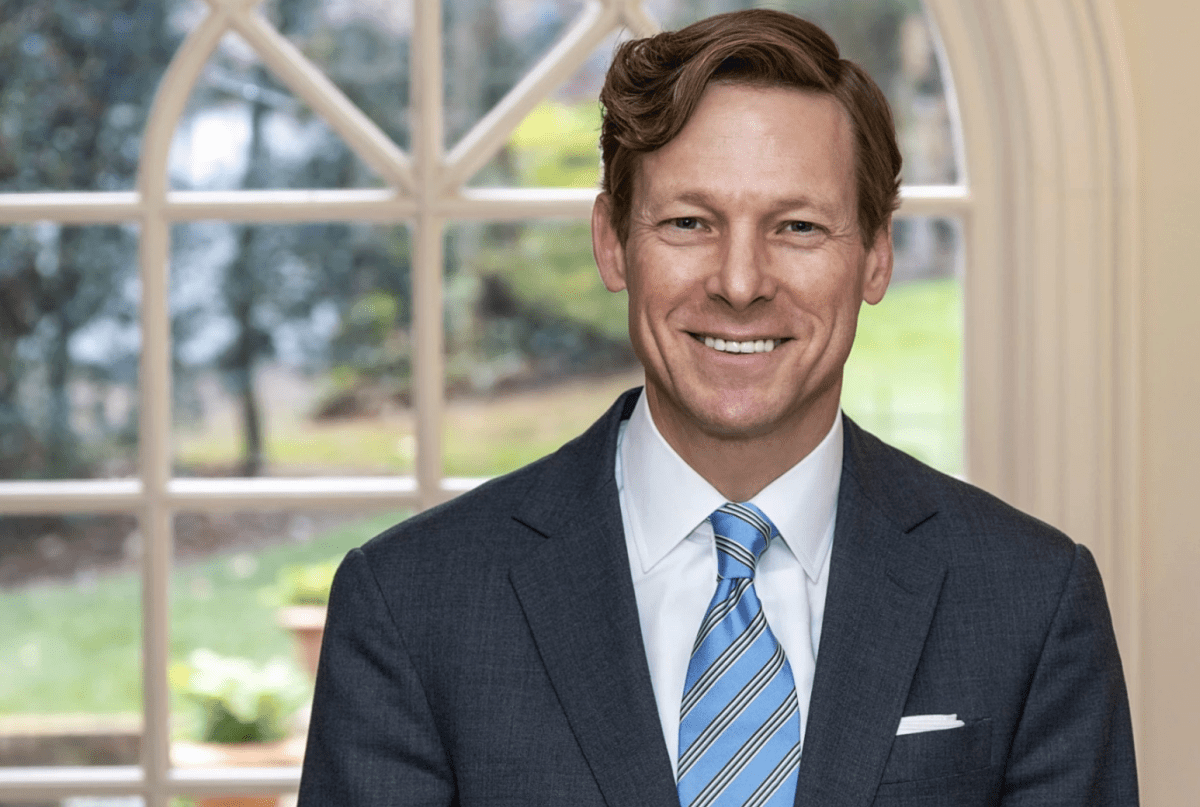Lee Roberts meets me at the University Club of San Francisco on a Friday morning, hours before his football team will lose to Cal in heartbreaking fashion – a fumble at the goal line, because little about the University of North Carolina at Chapel Hill’s expensive experiment with Bill Belichick has gone according to script.
But Roberts, the Chancellor of UNC, doesn’t know this yet. Right now, he’s in California to talk about artificial intelligence, which is both forward thinking and also – I’d hazard a guess – a welcome distraction from a lot else happening at the esteemed, 235-year-old school.
“No one’s going to say to [students after they graduate from college], ‘Do the best job you can, but if you use AI, you’ll be in trouble,’” Roberts tells me, leaning into his central thesis about preparing students for the real world. “Yet we have some faculty members who are effectively saying that to students right now.”
Roberts has joined me in between other meetings in the city with AI companies because UNC has decided to make AI its north star. It’s a business bet, really. Roberts spent three decades in finance, most recently as managing partner of a private investment firm, and served as state budget director under a Republican governor. He taught budgeting as an adjunct at Duke but never worked in academic administration before becoming UNC’s interim chancellor in January of last year, a post made permanent eight months later.
Never mind that the university just lost 118 federal grants totaling $38 million as part of a sweeping effort by the federal government to terminate more than 4,000 grants across 600 institutions. Never mind that more than 900 people last year signed a statement saying they wouldn’t recognize Roberts as chancellor when he was appointed, calling the process a political “coronation” rather than a search. Never mind that Belichick’s much-touted return to football is currently a 2-4 trainwreck, with write-ups about the team’s dysfunction becoming routine fodder for sports writers. Roberts is focused on the future.
At UNC, Roberts explains, there’s a spectrum between faculty who are “leaning forward” with AI and those who have “their heads in the sand.” It’s diplomatic phrasing for what is clearly a culture war playing out in faculty lounges across UNC and – it’s probably safe to assume – at other schools across the world. While one UNC professor is assigning more research than students could complete without AI (“much closer to a real world scenario,” says Roberts), others are treating chatbots like anabolic steroids. If you use them, you’re cheating.
“We have 4,000 faculty members,” Roberts says, as a cable car clatters past the open window beside our table. “And they pride themselves, as they should, on their independence and autonomy in how they teach their classes.”
Techcrunch event
San Francisco
|
October 27-29, 2025
It sounds a little like code for: tenured professors can’t be forced to do anything. So Roberts is creating “incentive-based programs” to move the ball forward, like promoting one of the school’s deans into the role of Vice Provost for AI at the university. That individual, Jeffrey Bardzell, has been a professor for more than 20 years and has “experience both in technology and as a humanist,” says Roberts, adding that Bardzell is “exceptionally well-placed to help the faculty as a whole come further up to speed.”
As they do, UNC is barreling ahead on other fronts. In its biggest development to date, the university announced this month that it is merging two schools – the School of Data Science and Society and the School of Information and Library Science – into one yet-to-be-named entity with AI studies at the center of the Venn diagram.
UNC isn’t alone in betting big on AI – at least 14 colleges now offer bachelor’s degrees in artificial intelligence, and universities like Arizona State University have made headlines for integrating AI tools across all disciplines.
Still, creating this new school has worried some of the school’s library science students, who wonder what will happen to their degrees, judging by a report in the Daily Tar Heel, the school’s independent student newspaper. At least one faculty member also complained anonymously in a statement to the paper, saying Roberts pushed for the school without a “cogent idea” of what it will entail, adding that the “careers of faculty, staff and students at both of these schools are being sacrificed to Roberts’ ego.”
Roberts tells me the implementation will be collaborative, not top-down. He’s also clear that the move is proactive, not reactive. “This is not about shutting anything down,” he says. “It’s not predominantly a cost-savings move,” he continues, a possible nod to those lost federal research dollars, which amount to 3.5% of UNC’s overall research funding.
Roberts doesn’t minimize the devastation of losing grants – “in many cases, [people] lose their life’s work,” he acknowledges – but he’s also quick to note that 3.5% is “well within our average annual variance.” He adds that he has been spending “a lot of time talking with policymakers and legislators in Washington about the tremendous good that federal research funding represents. We need to be especially vigilant right now, when there’s so much uncertainty around [these dollars] that it’s really changing the basic structure of how large research universities have been funded.”
Of course, it raises questions about resources in the aggregate. Though UNC’s AI push is the topic du jour, I ask about the $10 million the school is paying Bill Belichick annually as part of a five-year deal signed back in January. I’m from Cleveland, I tell Roberts. I remember when Belichick cut Browns quarterback Bernie Kosar, a hometown hero. The city never forgave him.
Roberts is ready for this. College sports are changing rapidly, he says. Every peer institution spends at least as much on football; many spend more. Football drives revenue for 28 other sports. UNC just won its fourth national championship in women’s lacrosse, its 23rd in women’s soccer. None of that happens without football money.
“If we had hired somebody else and we were [down some games], everybody would be saying, ‘Hey, man, you could have had Bill Belichick,’” Roberts offers.
In reality, the prevailing narrative about Belichick isn’t just about wins and losses. Even if, ultimately, that’s exactly what it’s about, numerous outlets have published stories describing chaos inside the program, with players, parents, coaches, and administrators all painting a picture of a legendary NFL coach whose style doesn’t translate to college kids.
But Roberts isn’t making decisions based on “a couple of news stories,” he says. “Coach Belichick, in my view, has done a really good job integrating with our campus,” Roberts says. He shows up at other teams’ games. He sends pizzas to fraternities on Saturday nights. “He grew up on a college campus – his father was the coach at Navy.”
Hours after our conversation, UNC will lose to Cal when wide receiver Nathan Leacock fumbles the ball just as he’s crossing into the end zone for what would have been the game-winning touchdown. I can only imagine what the immediate reaction is like back in Chapel Hill.
My sense is that Roberts will brush it off. He may never be forgiven for not having a traditional academic background, but he also can’t afford to care that this bothers some people. I note that the 900-person petition took issue with the fact that, among the top 50 universities, Roberts is the only leader without higher education administration experience. The petition ran in the Daily Tar Heel, which has been critical of Roberts’ chancellorship throughout.
“I don’t think it was 900 students,” Roberts corrects me. “I think it was 900 people, regardless of whether they were students, faculty, staff, or just people in the world who signed an online petition.”
I ask how he felt about the whole episode. “No matter what your background was before you came into a job like this, you would have a lot to learn,” Roberts says. If you were a provost, you’d know nothing about “the business or finance or budgetary or political or operational or real estate sides of the university.” If you came from business, you’d need to learn the academic side.
It’s a reasonable point. The modern university chancellor is part CEO, part diplomat, part fundraiser, part academic leader, part sports executive. Presumably, no one arrives with all the skills required. “I think almost no matter what you did previously before coming into a job like this, there would be a learning curve,” Roberts says.
What strikes me about Roberts is that he seems relatively unbothered. The federal funding cuts are within the normal range. The Belichick hire is a wait-and-see situation. As for some of the faculty’s resistance to AI, it’s a puzzle to be solved.
He’s also making big bets just as higher education is being squeezed every which way. Federal funding is uncertain. Birth rate declines threaten future enrollment. The value of a college degree is in question, with more students graduating to find that the only jobs available to them are low-wage gigs they could have landed without spending staggering amounts on college. Now AI threatens to upend the whole model.
But Roberts sees opportunity where others might see a crisis. He also thinks the window of opportunity is shorter than some might imagine. “The challenge of AI is that we have to work relatively quickly, and we also have to cooperate across academic disciplines,” he says. “And those are two things that universities, historically, are not especially good at.”
Whether Roberts’ game plan works remains to be seen. What’s clear is that he’s betting moving fast and shaking things up is better than moving slowly and preserving tradition at highly ranked UNC.
“We’re going to try to make Carolina the number one public university in America,” he tells me.
It’s an ambitious vision, and as he delivers it, for better or worse, he sounds very much like a Silicon Valley CEO.
To hear this interview with Roberts, listen to TechCrunch’s StrictlyVC Download podcast; new episodes drop every Tuesday.
Disclaimer : This story is auto aggregated by a computer programme and has not been created or edited by DOWNTHENEWS. Publisher: techcrunch.com










